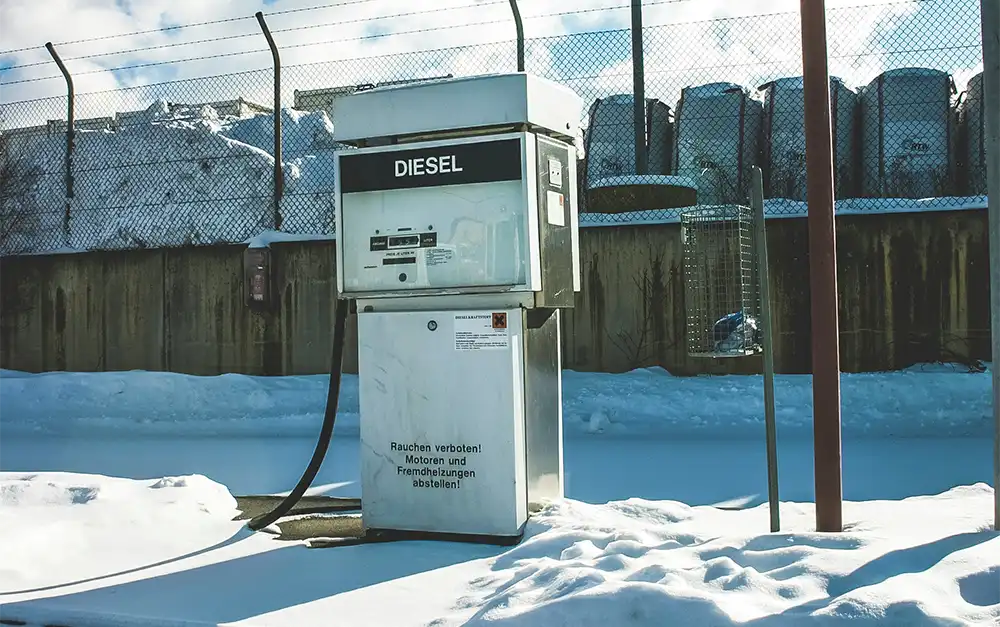
Diesel vehicles are renowned for their efficiency and durability, but freezing weather can pose unique challenges to their operation.
Diesel engines rely on specific fuel and exhaust treatment systems that can be significantly impacted by low temperatures.
Here we examine the effects of freezing weather on diesel cars, with a particular focus on diesel exhaust fluids, such as AdBlue and their behaviour in cold conditions.
 Find out how can freezing weather impact diesel
cars. (Credit: Markus
Spiske on Unsplash)
Find out how can freezing weather impact diesel
cars. (Credit: Markus
Spiske on Unsplash)
How freezing temperatures affect diesel cars
Diesel engines operate differently than gasoline engines, making them more sensitive to cold weather. Here are the primary issues freezing temperatures can cause:
- Thickening of diesel fuel
Diesel fuel contains paraffin, which can crystallise in freezing temperatures. This process, known as "gelling," can clog fuel lines and filters, preventing fuel from reaching the engine. When this happens, the engine may fail to start or lose power.
To counteract this, most diesel owners use winter-grade diesel or add anti-gelling additives to their fuel during colder months. These additives lower the temperature at which gelling occurs, ensuring smoother performance. - Hard starting and battery strain
Cold weather makes it harder for diesel engines to start due to the higher compression needed to ignite diesel fuel. Glow plugs, which preheat the combustion chamber, may take longer to warm up in freezing conditions. Additionally, cold weather decreases battery performance, which can strain the starter motor and reduce the likelihood of a successful ignition.
Regular maintenance, including checking the battery and glow plugs, is essential to avoid starting issues during the winter. - Thicker oil
Engine oil tends to thicken in cold weather, reducing its ability to lubricate critical engine components. This can lead to increased wear and tear on the engine. Switching to winter-grade oil, which remains thinner at lower temperatures, can help mitigate this problem. - Frozen fuel lines
Moisture in the fuel system can freeze in sub-zero temperatures, leading to blocked fuel lines. This issue often requires professional attention to resolve and may prevent the car from operating until the ice melts.
The impact of cold weather on AdBlue systems
AdBlue, a solution of urea and deionised water, is essential for reducing nitrogen oxide emissions in modern diesel engines. While highly effective in normal conditions, AdBlue has its own challenges in freezing weather:
- Freezing point of AdBlue
AdBlue begins to freeze at approximately -11°C (12°F). When frozen, AdBlue turns into a solid, which can block the supply lines and prevent the selective catalytic reduction (SCR) system from functioning. This can trigger dashboard warnings, reduce engine performance, and potentially lead to non-compliance with emissions regulations. - Thawing mechanism in diesel cars
Most diesel vehicles equipped with SCR systems are designed to handle frozen AdBlue. They include heating elements that thaw the AdBlue once the engine is running. However, this thawing process can take time, meaning the SCR system may not function immediately after starting the vehicle in extreme cold.
During this period, the car's computer system may limit engine performance to minimise emissions until the AdBlue system is operational. - Storage concerns
For diesel car owners who purchase AdBlue separately, storage is critical. Storing AdBlue in an unheated garage or outdoors during freezing weather can lead to solidification. To avoid this, AdBlue should be stored in a temperature-controlled environment above its freezing point. - Potential damage to components
Repeated freezing and thawing cycles can lead to the crystallisation of urea within the AdBlue system. This may cause blockages, reduce the efficiency of the SCR system, and require costly repairs. Regular servicing and using high-quality AdBlue can minimise these risks.
Tips to protect diesel cars in freezing weather
To ensure your diesel car operates smoothly during freezing conditions, follow these tips:
- Use Winter-Grade Diesel Fuel: Switch to winter-grade diesel or use anti-gelling additives to prevent fuel issues.
- Maintain the Battery: Test your battery regularly and replace it if its performance drops.
- Check Glow Plugs: Ensure glow plugs are functioning optimally to facilitate cold starts.
- Store AdBlue Properly: Keep AdBlue in a heated environment to prevent freezing.
- Run the Engine Regularly: Periodically starting and running the engine in cold weather can prevent fuel line and system freezes.
- Service the AdBlue System: Regular maintenance can catch early signs of wear or crystallisation in the AdBlue system.
Verdict: Cold weather and diesel cars
Freezing weather poses a range of challenges for diesel cars, from fuel gelling to frozen AdBlue systems. Understanding these issues and taking proactive steps can help maintain your car's performance and reliability.
By using winter-grade fuels, storing AdBlue properly, and ensuring regular maintenance, you can navigate the winter months with confidence.
Protecting your diesel vehicle from the effects of cold weather not only ensures a smooth ride but also prolongs the life of your car’s critical systems.
Subscribe for free motoring and travel news here - support independent journalism
Most read motoring content
Take a look at more of our top motoring-related content here...
-
How to spot a fake undercover police car
-
Do I need to pay the Dartford Crossing charge on Sundays?
-
Will I get a speeding ticket after being flashed
-
Do I need an international driving permit for France and Spain
-
Secret parking offences you're committing revealed
-
Alternative routes for beating jams on the M25
-
Alternative routes for the M1 motorway
-
Alternative routes for the M6 motorway
-
How old are my tyres - find out instantly here
-
What are the black dots on my windscreen for?
-
Are my sunglasses legal for driving?
Author: Pete Barden:
Twitter: @pete_barden
Pete Barden is a qualified journalist who has written and produced for publications including The Sun (thesun.co.uk), New Statesman Media Group, Whatcar? (Whatcar.com) Stuff Magazine (Stuff.tv), Fastcar Magazine (Fastcar.co.uk), Maxim Magazine and UK broadcast stations within the Heart network (Formerly GCAP). Pete specialises in motoring and travel content, along with news and production roles. You can find out more about Pete Barden on LinkedIn.












